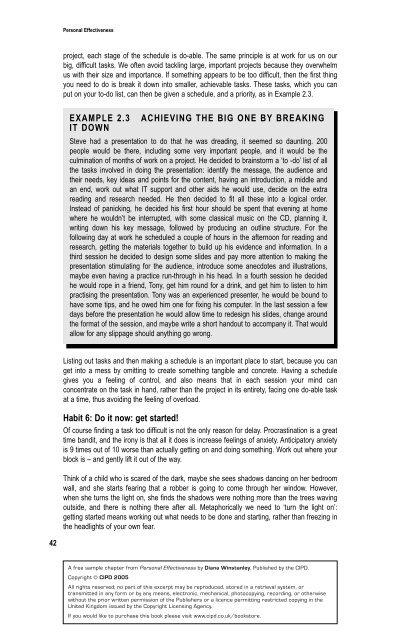Download - CIPD
Download - CIPD
Download - CIPD
You also want an ePaper? Increase the reach of your titles
YUMPU automatically turns print PDFs into web optimized ePapers that Google loves.
Personal Effectivenessproject, each stage of the schedule is do-able. The same principle is at work for us on ourbig, difficult tasks. We often avoid tackling large, important projects because they overwhelmus with their size and importance. If something appears to be too difficult, then the first thingyou need to do is break it down into smaller, achievable tasks. These tasks, which you canput on your to-do list, can then be given a schedule, and a priority, as in Example 2.3.EXAMPLE 2.3 ACHIEVING THE BIG ONE BY BREAKINGIT DOWNSteve had a presentation to do that he was dreading, it seemed so daunting. 200people would be there, including some very important people, and it would be theculmination of months of work on a project. He decided to brainstorm a ‘to -do’ list of allthe tasks involved in doing the presentation: identify the message, the audience andtheir needs, key ideas and points for the content, having an introduction, a middle andan end, work out what IT support and other aids he would use, decide on the extrareading and research needed. He then decided to fit all these into a logical order.Instead of panicking, he decided his first hour should be spent that evening at homewhere he wouldn’t be interrupted, with some classical music on the CD, planning it,writing down his key message, followed by producing an outline structure. For thefollowing day at work he scheduled a couple of hours in the afternoon for reading andresearch, getting the materials together to build up his evidence and information. In athird session he decided to design some slides and pay more attention to making thepresentation stimulating for the audience, introduce some anecdotes and illustrations,maybe even having a practice run-through in his head. In a fourth session he decidedhe would rope in a friend, Tony, get him round for a drink, and get him to listen to himpractising the presentation. Tony was an experienced presenter, he would be bound tohave some tips, and he owed him one for fixing his computer. In the last session a fewdays before the presentation he would allow time to redesign his slides, change aroundthe format of the session, and maybe write a short handout to accompany it. That wouldallow for any slippage should anything go wrong.Listing out tasks and then making a schedule is an important place to start, because you canget into a mess by omitting to create something tangible and concrete. Having a schedulegives you a feeling of control, and also means that in each session your mind canconcentrate on the task in hand, rather than the project in its entirety, facing one do-able taskat a time, thus avoiding the feeling of overload.Habit 6: Do it now: get started!Of course finding a task too difficult is not the only reason for delay. Procrastination is a greattime bandit, and the irony is that all it does is increase feelings of anxiety. Anticipatory anxietyis 9 times out of 10 worse than actually getting on and doing something. Work out where yourblock is – and gently lift it out of the way.Think of a child who is scared of the dark, maybe she sees shadows dancing on her bedroomwall, and she starts fearing that a robber is going to come through her window. However,when she turns the light on, she finds the shadows were nothing more than the trees wavingoutside, and there is nothing there after all. Metaphorically we need to ‘turn the light on’:getting started means working out what needs to be done and starting, rather than freezing inthe headlights of your own fear.42A free sample chapter from Personal Effectiveness by Diana Winstanley. Published by the <strong>CIPD</strong>.Copyright © <strong>CIPD</strong> 2005All rights reserved; no part of this excerpt may be reproduced, stored in a retrieval system, ortransmitted in any form or by any means, electronic, mechanical, photocopying, recording, or otherwisewithout the prior written permission of the Publishers or a licence permitting restricted copying in theUnited Kingdom issued by the Copyright Licensing Agency.If you would like to purchase this book please visit www.cipd.co.uk/bookstore.

















